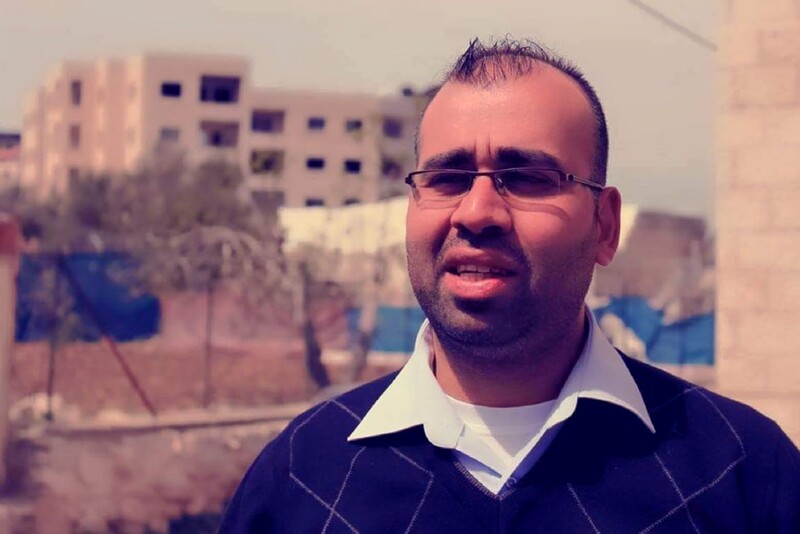Rights and Accountability 3 March 2016

Ahmad Hamad al-Betawi (via Facebook)
An Israeli military court sentenced a Palestinian journalist to 11 months in prison on Monday for alleged incitement.
Ahmad Hamad al-Betawi, an editor with Quds Net News Agency, had been awaiting trial since he was arrested last June for allegedly violating bail conditions on which he had been released from a previous arrest in February 2014.
Israeli military prosecutors had accused al-Betawi, 35, of using his work to incite against Israel’s occupation, according to a statement released by the Palestinian Prisoner Center for Studies.
The center also said that al-Betawi was charged with advocating “Palestinian nationalistic causes,” including prisoners’ rights.
In addition to serving time in prison, al-Betawi must pay a $500 fine.
When he was first arrested, al-Betawi was reportedly prevented from being accompanied by a lawyer during court sessions.
Al-Betawi was arrested in the middle of the night on 1 June from his home in Nablus, in the occupied West Bank. The Israeli army raided his home and confiscated his phone and laptop.
Attacks on journalists
Al-Betawi joins a growing list of journalists who have been detained in relation to their work.
Thirty-three-year-old journalist Muhammad al-Qiq, who ended his historic 94-day hunger strike last week, was placed under administrative detention after being interrogated extensively about his work.
In January, Mujahid al-Saadi, a reporter for Palestine Today from Jenin, was arrested. A month later he was accused of “aiding the enemy.”
Also arrested in January were Mahmoud al-Qawasmeh, a sports reporter for Radio Hebron, and Muhammad Qaddoumi, a political commentator and head of the Hamas bloc at Birzeit University.
Since last summer at least nine Palestinian journalists have been arrested and either placed under administrative detention or sentenced to serve time behind bars.
Administrative detention is the Israeli practice of detaining Palestinians for prolonged periods without charge or trial. It has been universally condemned by human rights organizations as a violation of fundamental rights.
In recent months, an increasing number of Palestinians have been charged with “incitement” for their media work or posts on social media.
Last November, Israel proposed a law that would expand the definition of “incitement to terrorism” by eliminating the need to prove that a person’s speech would actually lead to an act of what Israel terms terrorism.
Israel has also attacked Palestinian media under the pretext of stopping incitement by shutting down three radio stations in Hebron.
On 1 March, the Palestinian publication Donia Al-Watan reported that Israel’s military had set up a special command center to jam the broadcasts of the al-Aqsa channel in the West Bank for several hours each day.
The goal of this is to supposedly prevent “incitement” from reaching youth in the West Bank.
Gaza
Journalists in Gaza are not exempt from harassment.
On 22 February, Israeli authorities detained Muhammed Khalil Abu Fayyad, 42, at Erez crossing for approximately seven hours.
He was interrogated for one hour before Israel revoked his exit permit from Gaza. Fayyad works for the official Palestinian news agency WAFA and lives in Khan Younis, in the south of Gaza.

Salem Saudi with his daughter Layan and niece Shayma in the ruins of their home in Gaza City, in an award-winning image taken on 26 June 2015.
APA imagesThe next day at Erez crossing, Israeli authorities prevented photojournalist Emad Samir Nassar, 22, from leaving Gaza City to travel to the United Arab Emirates to receive the 2015 Sharjah Prize for the Arab Photo from the Union of Arab Photographers.
Nassar was cited for a photo he took in June 2015 of Gaza father Salem Saudi with his young daughter Layan and niece Shayma, who are playing in a bathtub in the ruins of the family’s home.
Preventing coverage
The Palestinian Centre for Development and Media Freedoms (MADA) documented a 154 percent increase in Israeli assaults on journalists over the last three years.
The Israeli army frequently detains Palestinian journalists during protests, preventing them from covering events.
Palestinian journalists have also accused the Israeli army of deliberately targeting them with violence during protests, assaults that have sometimes been caught on video.
While Palestinian journalists bear the brunt of Israeli occupation violence, Israel has recently lashed out at international journalists, accusing them of staging incidents to make Israel look bad.
The Foreign Press Association has sharply rejected the Israeli claims and strongly criticized Israeli forces in occupied East Jerusalem for briefly detaining William Booth, The Washington Post Jerusalem bureau chief, and Sufian Taha, the paper’s West Bank correspondent, last month.
The Israeli accusations prompted the Committee to Protect Journalists to express its concern about “rising pressure from the Israeli government on the foreign press,” including threats to revoke the credentials of journalists who publish “inaccurate headlines.”
Israel has also ordered Israeli journalists, dissidents and social media user to submit their postings to military censorship.
In November, MADA wrote that Israeli forces violently prevent Palestinian journalists from covering incidents because Israel wants to “hide reality and does not want the journalists to deliver their message to the world.”





